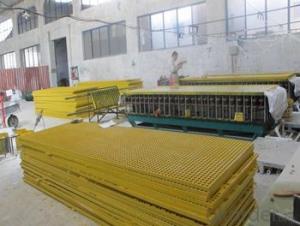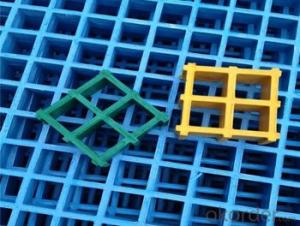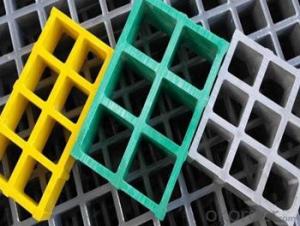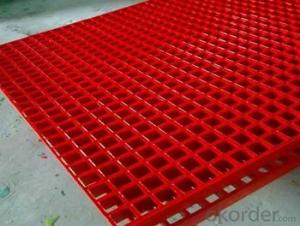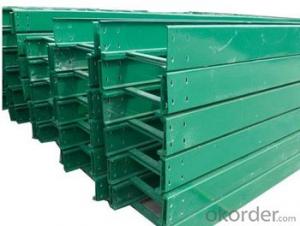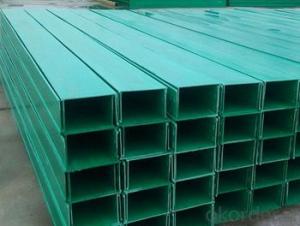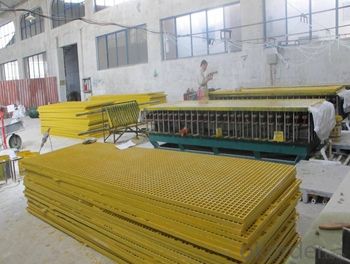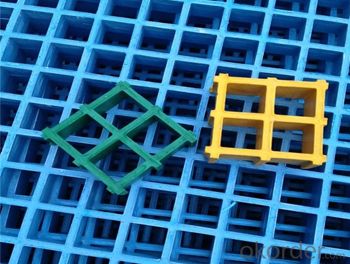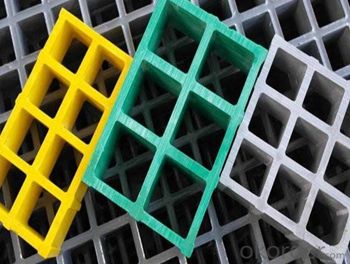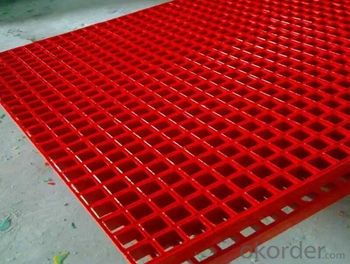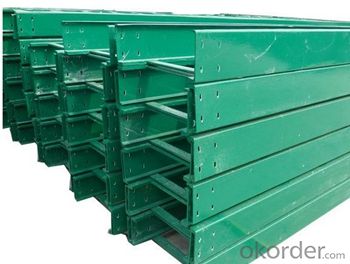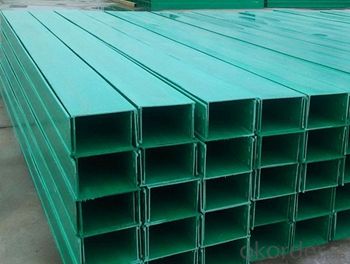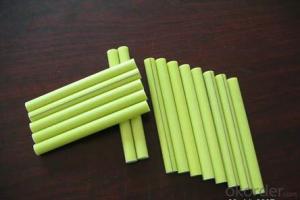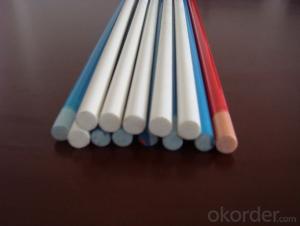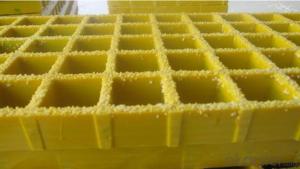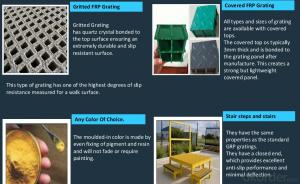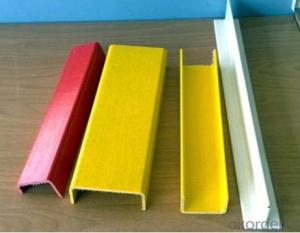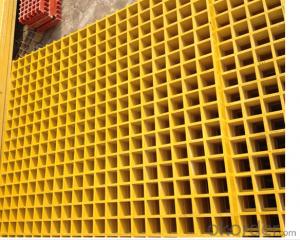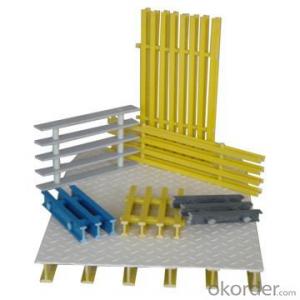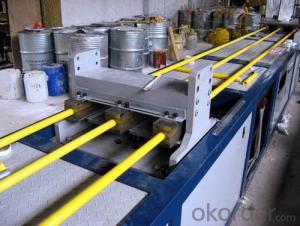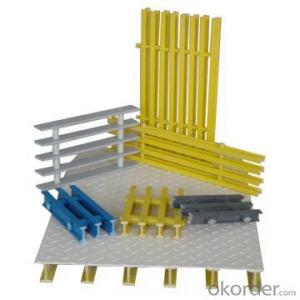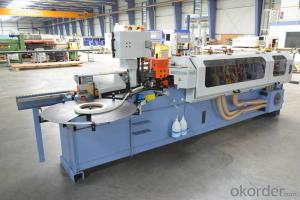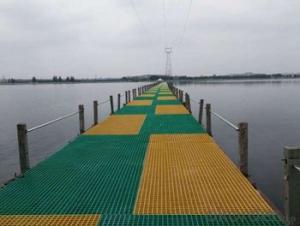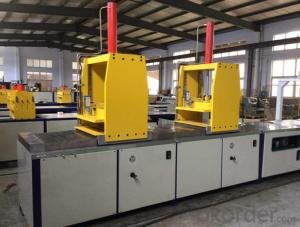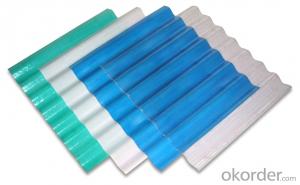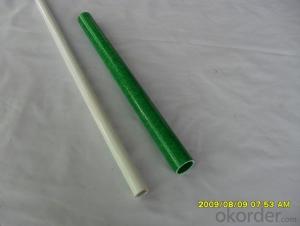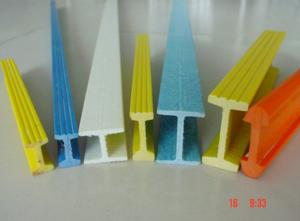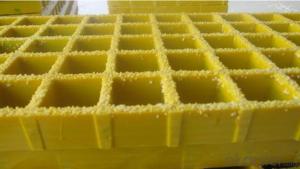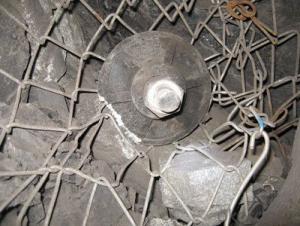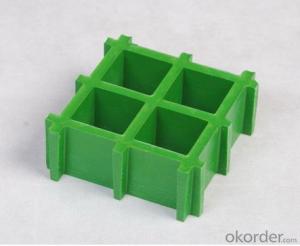FRP Pultrusion Profiles - Anti-Ageing FRP Pultruded Grating Made in China
- Loading Port:
- Tianjin
- Payment Terms:
- TT OR LC
- Min Order Qty:
- 16 watt
- Supply Capability:
- 100000 watt/month
OKorder Service Pledge
OKorder Financial Service
You Might Also Like
Specification
FRP PULTRUDED GRATING AND PULTRUSION PROCESS
PRODUCT DESCRIPTION
Pultruded grating is made by a particular assembly process, which using “I” shape as its main load-bearing and special rod to go through the bearing bar. Pultruded grating include the standard grating and the custom grating, the custom grating can be designed to meet customer’s requirement or special using condition by changing the shape, size and space of the bearing bars, the surface can be covered with lozenge panel, grit panel, or added the anti-slippery sand directly.
FRP pultruded grating has the most characteristics of molded grating, but it has its distinct advantages, it has very high fiberglass content in the loading direction, so it has very high load capability, it has more superiority when used at wide span, so that the basic support will be decreased and the project cost will be reduced accordingly.
SPECIFICATION
The standard space between two crossbars is 6 inch or 12 inch.
Thickness (mm) | Bar width (mm) | Open space (mm) | Open rate (%) | Approx weight (kg/m |
25.4 | 15.2 | 22.8 | 60 | 13.2 |
25.4 | 15.2 | 15.2 | 50 | 15.9 |
25.4 | 15.2 | 10.1 | 40 | 18.5 |
25.4 | 40 | 10.8 | 21 | 14.5 |
38.1 | 15.2 | 22.8 | 60 | 15.8 |
38.1 | 15.2 | 15.2 | 50 | 19.1 |
38.1 | 15.2 | 10.1 | 40 | 22.4 |
50.8 | 25.4 | 25.4 | 50 | 16.6 |
50.8 | 25.4 | 12.7 | 33 | 21.1 |
FEATURES
a. Anti-corrosion and anti-rust
b. Light weight and high strength
c. Anti-flammable
d. Anti- fatigue
e. Safe and anti-slippery
f. Anti-ageing
g. Easy of maintenance
h. Excellent electromagnetism property
i. Good economic benefit
FIELDS SERVED
Sewage treatment,
water supply and drainage,
chemical industry,
oil industry,
power engineering,
pulp and paper,
construction engineering,
spinning, marine engineering.
APPLICATION
Operation terrace,
stair walkway,
ground floor,
trench cover,
sidewalk,
foot bridge,
equipment safety fence,
scaffold.
COMPANT DESCRIPTION
CNBM International Corporation is one subsidiary of CNBM, we focus on offering good-quality products,professional service and complete solution to our customers. Strong delivery capacity, advanced technology& management, strong financing capability and excellent after-sale service are our advantages in sharing international market.
FAQ
1.Q:Are you factory or trading company ?
A:We are Factory produce FRP machines and FRP products.
2.Q:If can customized by customers requirements?
A:yes,we can produce the machine with customized size.
3.Q:How about the payment?
A:We accept any kind of payment.
4.Q:What is the guarantee?
A:Gurantee is one year.
5.Q:If you can training?
A:yes ,we can training in our factory also can send engineers to your factory training.
PICTURES
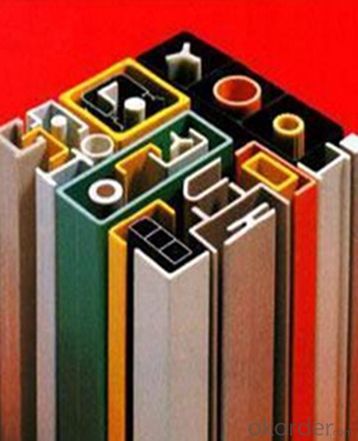
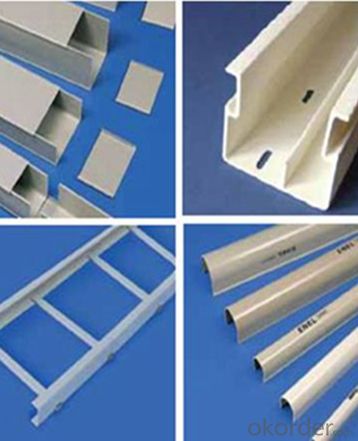
- Q: Are FRP pultrusion profiles resistant to hydrocarbons?
- FRP pultrusion profiles are known to be resistant against hydrocarbons. By combining different reinforcing fibers, such as fiberglass or carbon fiber, with a polymer matrix, FRP materials exhibit a high level of resistance to chemical corrosion, including hydrocarbons. This resistance makes FRP pultrusion profiles an excellent choice for applications that involve exposure to hydrocarbons, such as in the oil and gas industry, chemical processing plants, and fuel storage facilities. However, it is important to bear in mind that the level of resistance may vary depending on the specific resin used in the FRP material, as well as the concentration and temperature of the hydrocarbons present. Hence, it is advisable to consult with the manufacturer or supplier of the FRP pultrusion profiles to confirm their compatibility with the particular hydrocarbon environment at hand.
- Q: What are the typical applications of FRP pultrusion profiles?
- FRP pultrusion profiles possess unique properties that make them applicable in various fields. Examples of their typical uses include: 1. Construction and Infrastructure: FRP profiles serve as structural elements in buildings, bridges, and infrastructure projects. They are commonly employed for beams, columns, decks, and reinforcement due to their impressive strength-to-weight ratio, resistance to corrosion, and durability. 2. Industrial and Chemical Processing: The industrial sector heavily utilizes FRP profiles for platforms, walkways, ladders, and handrails. These profiles exhibit excellent resistance to chemicals, heat, and corrosion, making them well-suited for harsh environments. 3. Electrical and Telecommunication: FRP profiles find utility in electrical and telecommunication systems, fulfilling roles such as cable trays, ladder racks, and support structures. They provide electrical insulation and are non-conductive, ensuring safety and reliability in these applications. 4. Transportation: The transportation industry benefits from FRP profiles, particularly in the production of lightweight components for vehicles like buses, trains, and trucks. These profiles aid in weight reduction, improve fuel efficiency, and enhance overall vehicle performance. 5. Marine and Offshore: FRP pultrusion profiles excel in marine and offshore applications due to their resistance to saltwater, UV radiation, and harsh environmental conditions. They are employed in boat hulls, piers, dock fenders, and other offshore structures. 6. Recreation and Sports: FRP profiles contribute to the production of recreational equipment like ladders, slides, playground equipment, and sports accessories. Their strength, durability, and weather resistance make them ideal for these applications. 7. Water Treatment and Wastewater Management: FRP profiles find extensive use in water treatment plants, sewage systems, and wastewater management facilities. They fulfill roles such as grating, handrails, ladders, and other structural components due to their resistance to chemicals and corrosion. In summary, the versatility, strength, corrosion resistance, and lightweight nature of FRP pultrusion profiles make them suitable for diverse applications in various industries.
- Q: Can FRP pultrusion profiles be used in telecommunications applications?
- Yes, FRP pultrusion profiles can be used in telecommunications applications. FRP (Fiber Reinforced Polymer) offers several advantages such as high strength-to-weight ratio, corrosion resistance, and electrical insulation properties, making it suitable for telecom infrastructure like antenna supports, cable trays, and enclosures. Additionally, FRP pultrusion profiles can be customized to meet specific design requirements, making them a versatile choice for telecommunications applications.
- Q: Can not use glass steel support column, the main support for the door
- Can not. Strength is not good. It is recommended to use FRP for exterior decoration, with steel skeleton inside.
- Q: Can FRP pultrusion profiles be used in the construction of pedestrian tunnels?
- Yes, FRP (Fiber Reinforced Polymer) pultrusion profiles can be used in the construction of pedestrian tunnels. FRP profiles offer several advantages such as high strength-to-weight ratio, corrosion resistance, and durability, making them suitable for tunnel construction. Additionally, FRP profiles can be easily customized to meet specific design requirements and offer long-term cost savings due to their low maintenance needs.
- Q: Can FRP pultrusion profiles be used in infrastructure projects?
- Yes, FRP pultrusion profiles can be used in infrastructure projects. These profiles are lightweight, durable, and corrosion-resistant, making them ideal for applications in bridges, walkways, railings, and other structural components. They offer high strength-to-weight ratios and can be customized to meet specific project requirements. Additionally, FRP pultrusion profiles are non-conductive, making them suitable for electrical infrastructure projects.
- Q: Are FRP pultrusion profiles resistant to chemicals used in agricultural applications?
- Yes, FRP pultrusion profiles are generally resistant to chemicals used in agricultural applications. FRP (Fiber Reinforced Polymer) composites have excellent chemical resistance properties, making them suitable for various agricultural environments. These profiles can withstand exposure to fertilizers, pesticides, herbicides, and other chemicals commonly used in agricultural applications without experiencing degradation or damage.
- Q: Are FRP pultrusion profiles resistant to moisture or humidity?
- Yes, FRP pultrusion profiles are highly resistant to moisture and humidity. The combination of fiberglass reinforcement and resin matrix used in their construction makes them non-corrosive and impervious to water absorption. This inherent resistance ensures their durability and performance in humid or moist environments without compromising their structural integrity.
- Q: Are FRP pultrusion profiles resistant to hydrochloric acid?
- FRP pultrusion profiles exhibit a general resistance to hydrochloric acid. The corrosion resistance of FRP materials varies based on the specific resin and fiber used during manufacturing. Nevertheless, most FRP pultrusion profiles are designed to endure exposure to a wide array of chemicals, including hydrochloric acid. The corrosion resistance of FRP is attributed to the chemical inertness of the resin matrix, typically composed of polyester, vinyl ester, or epoxy. These resins form a protective barrier against chemical attack, allowing FRP profiles to maintain their structural integrity even in harsh surroundings. However, the level of resistance may fluctuate depending on the concentration and temperature of the hydrochloric acid. In instances of high concentration or elevated temperatures, the resistance may diminish. It is always recommended to refer to the manufacturer's specifications or seek expert advice to ensure the suitability of FRP pultrusion profiles for specific acid concentrations and temperature ranges. In conclusion, FRP pultrusion profiles are renowned for their exceptional chemical resistance and are frequently selected for applications involving exposure to acids or corrosive environments.
- Q: Are FRP pultrusion profiles resistant to oil or fuel spills?
- FRP pultrusion profiles exhibit a general resistance to oil or fuel spills, which is well-known in the industry. This is due to their exceptional chemical resistance, particularly against oils and fuels, which is attributed to the combination of the polymer resin and reinforcing fibers. This unique blend creates a robust and enduring material capable of withstanding exposure to various substances. The impermeable nature of FRP pultrusion profiles is another significant advantage, making them impervious to oil and fuel. Consequently, even in the event of a spill, these profiles will not absorb the substances, thus preventing any potential harm or deterioration. Furthermore, FRP possesses corrosion resistance and does not react with oils or fuels, ensuring its longevity and performance. These remarkable qualities make FRP pultrusion profiles highly sought after in industries where oil or fuel spills are a concern, such as oil refineries, chemical plants, and offshore platforms. They provide a dependable solution for applications requiring resistance to chemical exposure, offering a cost-effective and low-maintenance alternative to conventional materials.
Send your message to us
FRP Pultrusion Profiles - Anti-Ageing FRP Pultruded Grating Made in China
- Loading Port:
- Tianjin
- Payment Terms:
- TT OR LC
- Min Order Qty:
- 16 watt
- Supply Capability:
- 100000 watt/month
OKorder Service Pledge
OKorder Financial Service
Similar products
Hot products
Hot Searches
Related keywords
